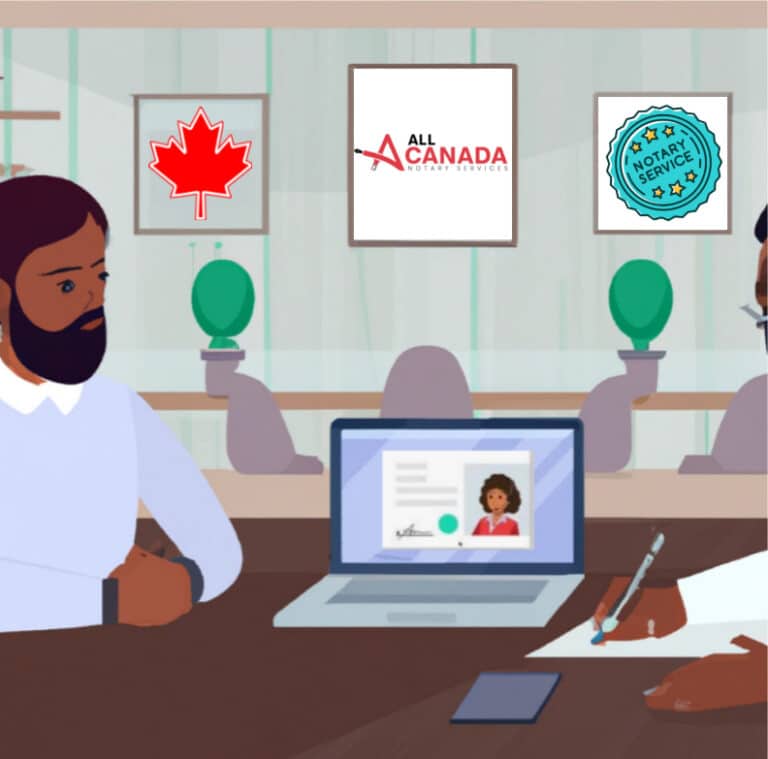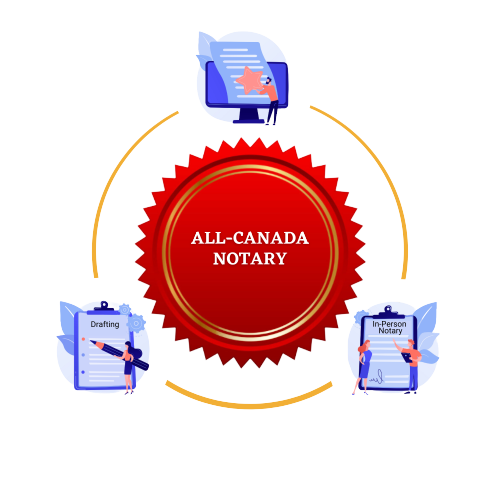Let me take you on a delightful journey through the world of online witnessing of Wills in Ontario. Whether you are well-acquainted with the digital realm or prefer traditional means, this guide aims to enlighten all. In this blog post, we delve into the process of remote witnessing of Wills in Ontario and elucidate how All-Canada Notary can assist you in efficiently finalizing your Will.

Can I legally have my Will witnessed online in Canada?
Absolutely! All-Canada Notary ensures the process meets all legal standards. It’s crucial to know that as long as the legal requirements are met, remote Will witnessing is as valid as its in-person counterpart and 100% legal in Ontario under the following laws:
- Bill 245, Accelerating Access to Justice Act, 2021 (“Bill 245”), which received Royal Assent on April 19, 2021, amended the Succession Law Reform Act and the Substitute Decisions Act, 1992 to permanently provide for the remote execution and witnessing of Wills and Powers of Attorney.
- Effective August 1, 2020, Ontario commissioning legislation permits the practice of remote commissioning.
- As of May 12, 2020, under Bill 190, the Ontario Government amended the Notaries Act providing for circumstances in which a notary public need not be in the physical presence of the person with respect to whom the notary public is exercising his or her powers.
What are the requirements for signing your Will online in Ontario?
The testator (that’s you, the person creating the Will!) and both witnesses must be present at the same time. Yes, even if it’s virtual. In Ontario, the Will has to be signed by the testator in the presence of two witnesses, and they must sign in the presence of the testator and each other. One witness should be licensed by the Law Society of Ontario.
Who can serve as a witness for my will in Canada?
The Will must be witnessed by TWO individuals whether they are friends, neighbors, or co-workers.
Who is ineligible to witness my will?
The following individuals cannot witness your Will:
- A beneficiary
- The spouse of a beneficiary
- Anyone under 18 years of age
One of the witnesses should complete an affidavit of execution. While a Will is valid without an affidavit of execution, an affidavit of execution may be required if the Will has to go through probate. Probate is the legal process that grants the legal authority for an executor to act.
What is the step-by-step remote Will witnessing process?
Now that you’re prepped and ready, it’s showtime! Let’s break down the step-by-step process:
Step 1. Schedule your appointment with a Notary Public here
Step 2. Connect with the notary: Using platforms like Zoom or Google Meet, you’ll be face-to-face with your chosen notary. If you’ve picked someone from All-Canada Notary, they’ll guide you seamlessly.
Step 3. Document Verification: The notary will first verify the document you’re presenting. They’ll ensure it’s the correct Will.
Step 4. Identity Confirmation: Just like in a physical meeting, the notary will confirm it’s actually you! So, have your ID ready.
Step 5. Signing & Witnessing: Here comes the main event. You sign and initial each page of the Will, and your one witness signs the Will and the Affidavit of Execution.
Step 6. Send your documents to our Toronto location. Our Notary Public will complete your Will and affidavits of execution and mail your documents back to you.
Step 7. (Optional) Share your positive experience with a review.
Important: In the execution of the Will, our preference is for your second witness to physically sign the same Will that you signed. This necessitates the witness being physically present with you during the remote meeting with the Notary Public, thus avoiding the “In counterpart” process. The “In counterpart” means that if the witness is joining the meeting remotely, they would sign a copy of the Will instead of the original, and the separately signed copies would then be considered as one single document in legal terms. Having the witness physically present to sign the original Will simplifies the process, ensuring that there is only one copy of the executed Will.
What does “witnessed in counterpart” mean?
“Witnessed in counterpart” is a legal term that has gained prominence during the COVID-19 pandemic due to adjustments in legal processes to accommodate social distancing and other public health measures. In the context of online witnessing of Wills, “witnessed in counterpart” means that the Will can be signed and witnessed in separate locations, and each party will have a separate but identical document (a counterpart). Once a Will is signed in counterpart, it is immediately valid.
Can a notary public witness a Will in Ontario?
Yes, a notary public in Ontario can serve as a witness to the signing of a Will.
What benefits does remote Will witnessing offer?
The perks of this digital leap are aplenty:
- Convenience: No travel, no waiting rooms. Do it from your cozy couch!
- Safety: Especially in the current times, it reduces health risks associated with face-to-face interactions.
- Speed: Quick scheduling and the process itself can be faster than traditional methods.
- Global Reach: No matter where you are in the world, you can get your Will witnessed if you’re an Ontario resident.
Are there any tips for online witnessing of Wills?
- Signatures of the participants must be original (wet)signatures, not digital
- Keep a record. Video recordings of the witnessing can be a lifesaver for any future discrepancies.
- Picking Your Online Notary: Don’t just go with the first notary you find. Look them up, read reviews, and maybe even have a chat.
- Check their specialties: Not all notaries are created equal. Some, like us at All- Canada Notary, specialize in a broad range of notarial services both in-person and online. That breadth of experience can be a game-changer.
- Communication is key: Before you begin, have a chat. Discuss the process, fees, and any other concerns you might have.
- Tech check: Ensure your computer or device is working fine. A stable internet connection is a must. No one wants to freeze mid-signature!
- Quiet space: Just like an office, pick a quiet spot where you won’t be interrupted.
- Documents ready: Have your Will and any other necessary documents ready to go.
What are some key terms related to Wills?
- Will: A legal document that communicates a person’s final wishes concerning their assets, to be acted upon only at their demise. Simply put, individuals stipulate how they want their properties and assets to pass at their death by making a Will.
- Affidavit of execution: A document sworn by one of the witnesses to the Will verifying that he or she and the other witness were present at the time of execution of the document attached as exhibit A to the affidavit of execution. This document is often required when a person or company needs to prove that a particular document has been properly signed and witnessed in accordance with the law.
- Testator: A person who has written and executed a last Will and testament that is in effect at the time of their death.
Does my Will need to be notarized?
Generally, Wills do not need to be notarized. However, it is recommended that one of the witnesses swear an affidavit of execution in front of a notary or commissioner for taking oaths. This affidavit (also known as Ontario Court Form 74.8) is available for free download from the Ontario Court Forms website. This affidavit confirms that the witness saw the person making the Will sign it in front of them.
Who is entitled to see a copy of a Will in Ontario?
- Before Probate:
Executor: The person named as the executor in the Will is entitled to see it because they are responsible for administering the estate.
Beneficiaries: Generally, beneficiaries named in the Will should be informed of their interests, but there isn’t a legal obligation to show them the full Will.
- After Probate:
General Public: Once a Will has been probated, it becomes a public document. This means that essentially anyone can obtain a copy of a probated Will from the court by paying a fee.
Interested Parties: Those with a direct interest in the estate, such as beneficiaries and creditors, can access the probated Will.
How Much Does Remote Witnessing of a Will Cost
1. Online/virtual witnessing of one Will: $99.95. Includes:
- 1 (One) Last Will signing and witnessing
- 1 (One) Affidavit of Execution drafting & commissioning
- 1 (One) witness signing provided (you should have the 2nd witness)
- Regular mail within Canada included
2. Online witnessing of two Wills: $129.95
- 2 (Two) Last Wills signing and witnessing
- 2 (Two) notarized affidavits of execution drafting & commissioning
- 1 (One) witness provided (you should have the 2nd witness)
- Regular mail within Canada included
Prices are for signing and notarization of Wills and indicated services only and do not include drafting Wills. Prices do not include HST.
How can All-Canada Notary assist me with remote Will witnessing?
Navigating the online world of Will witnessing can seem overwhelming, but with the right guidance by All-Canada Notary, it can be incredibly straightforward. All-Canada Notary is offering convenient and affordable online witnessing of Wills. If you don’t have a witness, we can help you arrange the witness and complete the necessary documentation to ensure your documents are properly executed. Stay tuned for more, and remember, if you ever need a notary, All-Canada Notary is your go-to place!


